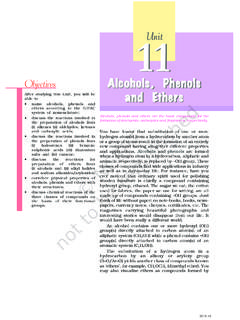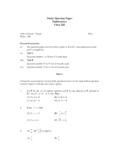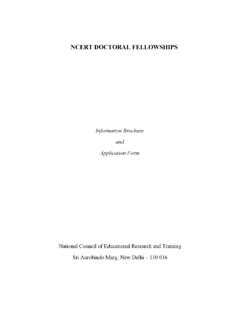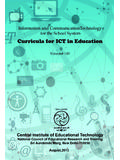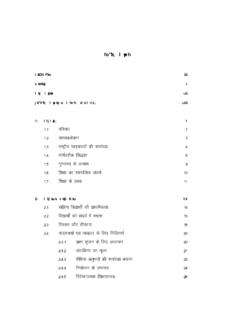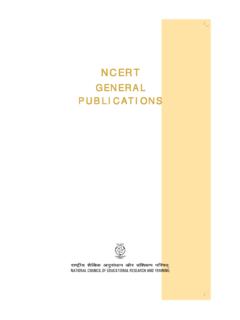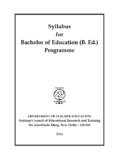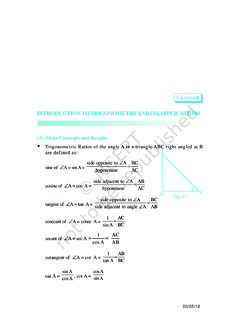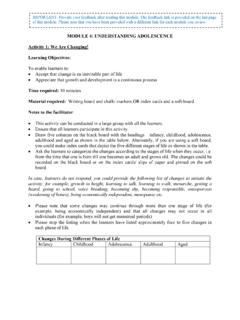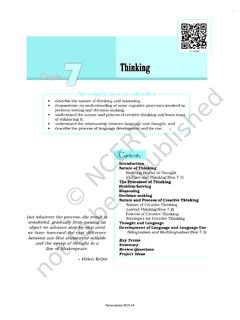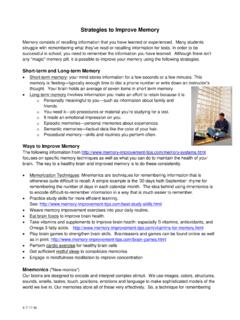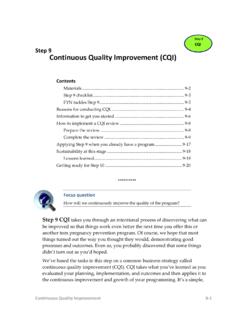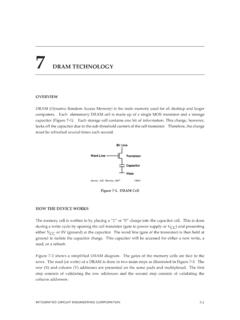Transcription of Chapter 7 - Human Memory - NCERT
1 Chapter7 Human MemoryHuman MemoryHuman MemoryHuman MemoryHuman MemoryHuman MemoryHuman MemoryHuman MemoryHuman MemoryHuman MemoryIntroductionNature of MemoryInformation Processing Approach : The Stage ModelMemory Systems : Sensory, Short-term and Long-ter m MemoriesWorking Memory (Box )Levels of ProcessingTypes of Long-term MemoryDeclarative and Procedural; Episodic and SemanticLong-term Memory Classification (Box )Methods of Memory Measurement (Box )Knowledge Representation and Organisation in MemoryMemory Making: Eyewitness and False Memories (Box ) Memory as a Constructive ProcessNature and Causes of ForgettingForgetting due to Trace Decay, Interference and Retrieval FailureRepressed Memories (Box )
2 Enhancing MemoryMnemonics using Images and OrganisationKey TermsSummaryReview QuestionsProject IdeasContents understand the nature of Memory , distinguish between dif ferent types of Memory , explain how the contents of long-term Memory are r epresented andorganised, appreciate the constructive and reconstructive processes in Memory , understand the nature and causes of forgetting, and lear n the strategies for improving reading this Chapter , you would be able toThe advantage of badmemory is that oneenjoys several times,the same good thingsfor the first time. Friedrich Nietzsche NCERTnot to be republishedPsychology132you perhaps learned during your earlyschooling.
3 Memory is conceptualised as aprocess consisting of three independent,though interrelated stages. These ar eencoding, storage, and retrieval. Anyinformation received by us necessarily goesthrough these stages.(a)Encoding is the first stage which r efers toa process by which information is recor dedand registered for the first time so that itbecomes usable by our Memory an externa l stimulus impinges onNATURE OF MEMORYM emory refers to retaining and recallinginformation over a period of time, dependingupon the nature of cognitive task you arerequired to perform. It might be necessary tohold an information for a few seconds.
4 Forexample, you use your Memory to retain anunfamiliar telephone number till you havereached the telephone instrument to dial, orfor many years you still remember thetechniques of addition and subtraction whichAll of us are aware of the tricks that Memory plays on us throughout our lives. Haveyou ever felt embarrassed because you could not remember the name of a knownperson you were talking to? Or anxious and helpless because everything youmemorised well the previous day befor e taking your examination has suddenlybecome unavailable? Or felt excited because you can now flawlessly recite lines ofa famous poem you had learnt as a child?
5 Memory indeed is a very fascinating yetintriguing Human faculty. It functions to preserve our sense of who we are, maintainsour interpersonal relationships and helps us in solving problems and takingdecisions. Since Memory is central to almost all cognitive processes such asperception, thinking and problem solving, psychologists have attempted tounderstand the manner in which any information is committed to Memory , themechanisms through which it is retained over a period of time, the reasons why itis lost from Memory , and the techniques which can lead to Memory this Chapter , we shall examine all these aspects of Memory and understandvarious theories which explain the mechanisms of history of psychological research on Memory spans over hundred first systematic exploration of Memory is credited to Hermann Ebbinghaus, aGerman psychologist of late nineteenth century (1885).
6 He carried out manyexperiments on himself and found that we do not forget the learned material at aneven pace or completely. Initially the rate of forgetting is faster but eventually itstabilises. Another view on Memory was suggested by Frederick Bartlett (1932)who contended that Memory is not passive but an active process. With the help ofmeaningful verbal materials such as stories and texts, he demonstrated that memoryis a constructive process. That is, what we memorise and store undergoes manychanges and modifications over time. So there is a qualitative differ ence in whatwas initially memorised by us and what we retrieve or recall later. There are otherpsychologists who have influenced Memory research in a major way.
7 We shallreview their contributions in this Chapter at appropriate NCERTnot to be republishedChapter 7 Human Memory133our sensory organs, it generates neuralimpulses. These are received in different areasof our brain for further processing. Inencoding, incoming information is receivedand some meaning is derived. It is thenrepresented in a way so that it can beprocessed further.(b)Storage is the second stage of mation which was encoded must also bestored so that it can be put to use , therefore, refers to the processthrough which information is r etained andheld over a period of time.(c)Retrieval is the third stage of can be used only when one is ableto recover it from her/his Memory .
8 Retrievalrefers to bringing the stored information toher/his awareness so that it can be used forperforming various cognitive tasks such asproblem solving or decision-making. It maybe interesting to note that Memory failure canoccur at any of these stages. You may fail torecall an information because you did notencode it properly, or the storage was weakso you could not access or retrieve it PROCESSING APPROACH :THE STAGE MODELI nitially, it was thought that Memory is thecapacity to store all information that weacquire through lear ning and experience. Itwas seen as a vast storehouse where allinformation that we knew was kept so thatwe could retrieve and use it as and whenneeded.
9 But with the advent of the computer, Human Memory came to be seen as a systemthat processes infor mation in the same wayas a computer does. Both register, stor e, andmanipulate large amount of information andact on the basis of the outcome of suchmanipulations. If you have worked on acomputer then you would know that it has atemporary Memory (random access memoryor RAM) and a per manent Memory ( , a harddisk). Based on the programme commands,the computer manipulates the contents of itsmemories and displays the output on thescreen. In the same way, Human beings tooregister information, store and manipulate thestored information depending on the task thatthey need to perform.
10 For example, when youare required to solve a mathematical problem,the Memory relating to mathematicaloperations, such as division or subtraction arecarried out, activated and put to use, andreceive the output (the problem solution). Thisanalogy led to the development of the firstmodel of Memory , which was proposed byAtkinson and Shiffrin in 1968. It is known asStage SYSTEMS : SENSORY, SHORT-TERMAND LONG-TERM MEMORIESA ccording to the Stage Model, there are threememory systems : the Sensory Memory , theShort-term Memory and the Long-termMemory. Each of these systems have differentfeatures and perform different functions withrespect to the sensory inputs (see ).
